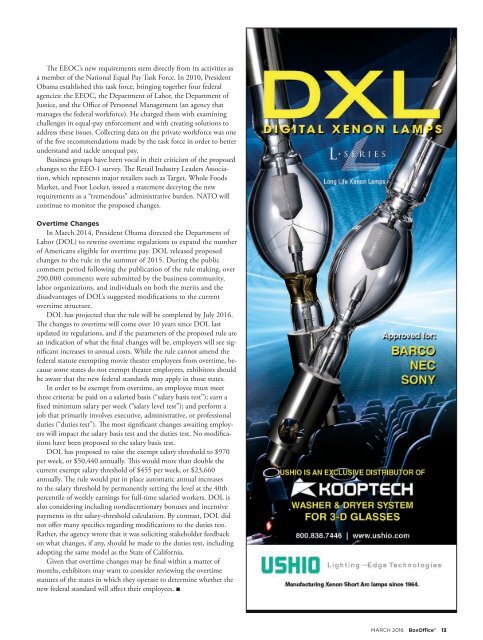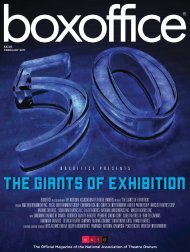Boxoffice - March 2016
The Official Magazine of the National Association of Theatre Owners
The Official Magazine of the National Association of Theatre Owners
You also want an ePaper? Increase the reach of your titles
YUMPU automatically turns print PDFs into web optimized ePapers that Google loves.
The EEOC’s new requirements stem directly from its activities as<br />
a member of the National Equal Pay Task Force. In 2010, President<br />
Obama established this task force, bringing together four federal<br />
agencies: the EEOC, the Department of Labor, the Department of<br />
Justice, and the Office of Personnel Management (an agency that<br />
manages the federal workforce). He charged them with examining<br />
challenges in equal-pay enforcement and with creating solutions to<br />
address these issues. Collecting data on the private workforce was one<br />
of the five recommendations made by the task force in order to better<br />
understand and tackle unequal pay.<br />
Business groups have been vocal in their criticism of the proposed<br />
changes to the EEO-1 survey. The Retail Industry Leaders Association,<br />
which represents major retailers such as Target, Whole Foods<br />
Market, and Foot Locker, issued a statement decrying the new<br />
requirements as a “tremendous” administrative burden. NATO will<br />
continue to monitor the proposed changes.<br />
Overtime Changes<br />
In <strong>March</strong> 2014, President Obama directed the Department of<br />
Labor (DOL) to rewrite overtime regulations to expand the number<br />
of Americans eligible for overtime pay. DOL released proposed<br />
changes to the rule in the summer of 2015. During the public<br />
comment period following the publication of the rule making, over<br />
290,000 comments were submitted by the business community,<br />
labor organizations, and individuals on both the merits and the<br />
disadvantages of DOL’s suggested modifications to the current<br />
overtime structure.<br />
DOL has projected that the rule will be completed by July <strong>2016</strong>.<br />
The changes to overtime will come over 10 years since DOL last<br />
updated its regulations, and if the parameters of the proposed rule are<br />
an indication of what the final changes will be, employers will see significant<br />
increases to annual costs. While the rule cannot amend the<br />
federal statute exempting movie theater employees from overtime, because<br />
some states do not exempt theater employees, exhibitors should<br />
be aware that the new federal standards may apply in those states.<br />
In order to be exempt from overtime, an employee must meet<br />
three criteria: be paid on a salaried basis (“salary basis test”); earn a<br />
fixed minimum salary per week (“salary level test”); and perform a<br />
job that primarily involves executive, administrative, or professional<br />
duties (“duties test”). The most significant changes awaiting employers<br />
will impact the salary basis test and the duties test. No modifications<br />
have been proposed to the salary basis test.<br />
DOL has proposed to raise the exempt salary threshold to $970<br />
per week, or $50,440 annually. This would more than double the<br />
current exempt salary threshold of $455 per week, or $23,660<br />
annually. The rule would put in place automatic annual increases<br />
to the salary threshold by permanently setting the level at the 40th<br />
percentile of weekly earnings for full-time salaried workers. DOL is<br />
also considering including nondiscretionary bonuses and incentive<br />
payments in the salary-threshold calculation. By contrast, DOL did<br />
not offer many specifics regarding modifications to the duties test.<br />
Rather, the agency wrote that it was soliciting stakeholder feedback<br />
on what changes, if any, should be made to the duties test, including<br />
adopting the same model as the State of California.<br />
Given that overtime changes may be final within a matter of<br />
months, exhibitors may want to consider reviewing the overtime<br />
statutes of the states in which they operate to determine whether the<br />
new federal standard will affect their employees. n<br />
MARCH <strong>2016</strong> BoxOffice ® 13

















